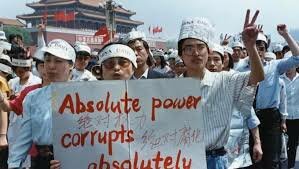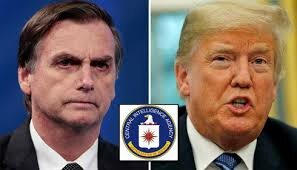
reported earlier this week that Lithuanian police detained and fined two Chinese citizens who were waving their country’s flag during a counter-protest against a rally in support of the violent Hong Kong protests late last month. The outlet also informed the world that the Lithuanian authorities lodged a complaint with the Chinese Embassy on the supposed basis that its diplomats acted “in violation of public order” by observing the event and requesting that their nationals be released from custody afterwards.
Chinese Foreign Ministry spokesman Geng Shuang responded by reaffirming that the diplomats “have been fulfilling their jobs based on the Vienna Convention on Diplomatic Relations. They have not violated local laws.” Embassy staff anywhere in the world have the right to monitor political events in their host country, but the Lithuanians scandalously implied without any evidence that the Chinese diplomats organized the counter-protest, hence the reason for their complaint.
This incident is extremely troubling for three main reasons. The first concerns the disproportionate response that the police took to patriotic Chinese who were waving their country’s flag during the counter-protest, who they allege were rowdy but who were nevertheless provoked by the rally in support of the violent Hong Kong protests. For the record, Mr. Geng was reported by Reuters as saying that his compatriots’ opposition to recent events was “totally reasonable”, but that it should be expressed in a “rational way”.
The second issue relates to the innuendo that China was somehow meddling in the internal political events in Lithuania, which resembles similar unsubstantiated allegations against Russian diplomats in Europe and elsewhere across the world. Chinese diplomats, like all of their peers abroad, have the right to observe political events, and their presence at the two demonstrations isn’t a breach of any ethical conduct on their part. In fact, they had every reason to want to see how everything would play out because of the nature of the rally itself.
This brings one around to the third reason why the incident was so troubling because the event in support of the violent Hong Kong protests had very clear anti-communist and separatist overtones. The participants were forming a human chain just like the one that Baltic residents formed three decades ago on that exact date on 23 August, 1989 to show their opposition to communism and demand for independence. Such a rally couldn’t but help attract the attention of Chinese diplomats and inflame the patriotic passions of ordinary Chinese there.
It’s the responsibility of the Lithuanian authorities to maintain law and order in their country, but they should do so without any double standards. The police should have anticipated that such a provocative rally would naturally produce a counter-protest in response and therefore should have undertaken preemptive measures to ensure that no disruptions of the sort that they alleged happened would occur. Instead, they singled out only one side and then concocted a conspiracy alleging that Chinese diplomats were behind the counter-protest.
It can only be speculated why the authorities behaved in such a way, but the end result is that their actions are the ones that appear to be aggressive, not the conduct of the patriotic counter-protesters or the Chinese diplomats. In fact, it almost seems like Lithuania is trying to intimidate this diaspora community and their official representatives as a sign of fealty to its allies abroad, namely the US. After all, their reaction is extremely scandalous and lends fodder to the fake news narrative of China meddling in the affairs of its partners.
It therefore can’t be discounted that other countries might engage in copycat acts of intimidation against patriotic Chinese who might engage in future counter-protests against forthcoming provocative rallies in support of the violent Hong Kong protests, or that more conspiracy theories might be created alleging that China’s diplomats were somehow involved. It can only be hoped that this doesn’t happen, but then again, it also wouldn’t be surprising since there are forces who are invested in increasing anti-Chinese sentiment abroad.
DISCLAIMER: The author writes for this publication in a private capacity which is unrepresentative of anyone or any organization except for his own personal views. Nothing written by the author should ever be conflated with the editorial views or official positions of any other media outlet or institution.





